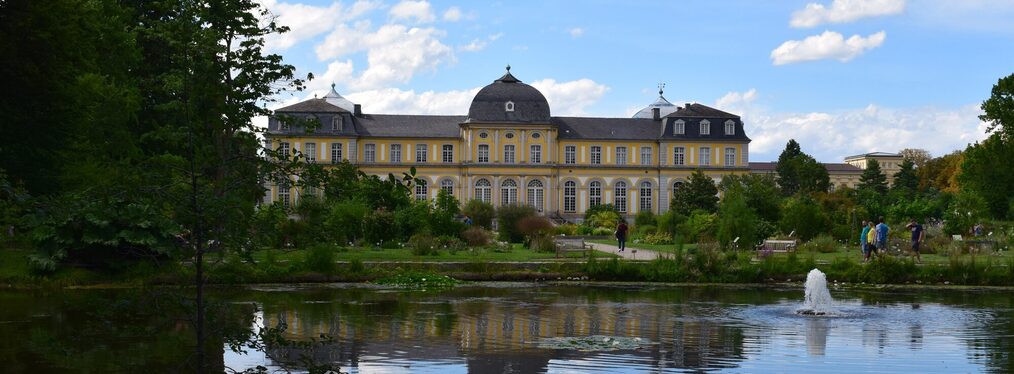Bonn - Internationality and history
In its federal capital days, the flair was strongly influenced by diplomats and employees of political institutions. Now, numerous international organizations and their employees contribute to the open and friendly atmosphere. After all, Bonn is not only the German city of the United Nations, but also a popular host for high-level international conferences and the headquarters of many German and internationally active non-governmental organizations (NGOs).
Bonn’s internationality is nothing new: The city on the Rhine can look back on a history that is as long as it is eventful. Starting with the first settlements in the Stone Age, people from different cultures have lived here on the banks of the Rhine for thousands of years. The settlement of a Roman military camp about 2,000 years ago, as part of today's UNESCO World Heritage Site "Lower Germanic Limes", was particularly formative for Bonn’s development as a city. It is therefore not surprising that evidence of the Roman era is still present in Bonn's cityscape. Numerous relics are also on display in the city’s museums, such as the “LVR-LandesMuseum Bonn”.
Neolithic hand axes, Roman sculptures, Celtic jewelry or medieval writings are living testimonies that here on the banks of one of the most important rivers and transport routes in Europe, the Rhine, people of different origins have always come, gone – and stayed. This was the backdrop for the development of the proverbial Rhenish way of life, which meets other people and life itself with open-mindedness, curiosity and tolerance. First of all, people in the Rhineland basically assume that nothing can be changed in the course of events: "Et kütt wie et kütt" (It will go the way it will go) is a corresponding saying in Rhenish dialect. Moreover, people are convinced that everything will turn out all right in the end. ("Et hätt noch emmer joot jejange" – It has always turned out well.) This acceptance of the inevitable, coupled with an unwavering optimism, has carried the people of Bonn through turbulent times.
Ludwig van Beethoven - Bonns greatest son
The era as electoral residence city was certainly one of Bonn's golden ages, when magnificent buildings such as the electoral residence palace (the university’s main building today) or the Poppelsdorf Palace were built. This period is also inextricably linked with the life of the city's great son, Ludwig van Beethoven, whose music achieved world fame. His legacy is highly valued and kept alive in Bonn, for Beethoven was not only a gifted, brilliant artist, but also a passionate advocate of values still valid to this day, such as freedom and brotherhood. In addition to his world-famous birthplace, the “Beethoven Orchester Bonn” and the annual Beethoven Festival ensure that he is present everywhere in the city and that his immortal music and cosmopolitan spirit keep spreading around the world.
Bonn as the cradle of federal German democracy
The people of Bonn consider the period of the newly founded Federal Republic of Germany to be one of the highlights in their city's history (and one that continues to have an impact to this day). After all, hardly anyone would have predicted that the rather small city on the Rhine at the end of the 1940s would become the cradle of West German democracy and the capital of the new Federal Republic after the end of World War II. For more than five decades, the (modest) city of Bonn was the stage on which West German politics as well as international state guests acted. A drop of bitterness in the joy of unification with the German Democratic Republic (GDR) was, after all, the Bundestag's decision to once again give Berlin the main role in governing.
A city reinvents itself
Once again, however, Bonn demonstrated its enormous potential to reinvent itself. In terms of federal politics, the city remains Germany's second political center; as a "federal city," it is still home to numerous ministries and federal agencies. After a phase of structural change, Bonn thus advanced to become a highly sought-after business location for young innovative companies as well as for major global players. The former location of public authorities and service has turned into one of the most attractive growth regions in Germany.
Bonn also continues to play a role in international politics and global issues: For example, Bonn is a competent and experienced host for major international conferences, such as the United Nations Climate Change Conference COP23 (2017), the largest conference ever held in Germany to date. Bonn has been an official location of the United Nations since 1996. The number of organizations operating from here has now grown to 26, including the World Climate Secretariat (UNFCCC) and the Secretariat of the United Nations Convention to Combat Desertification (UNCCD).
However, the motto "Shaping a sustainable future" not only encompasses Bonn’s UN family with around 1,000 staff members on the city's UN Campus. It also unites roughly 150 other German and international NGOs. Their constructive cooperation is stimulated by their close proximity, which creates short distances between the sustainability actors.
In addition to the business enterprises and political institutions, the rapidly expanding scientific institutions are also of great importance for Bonn. For example, Bonn's Friedrich Wilhelm University is one of the few universities of excellence in Germany. The differentiated offerings of various universities as well as renowned research institutions ensure that Bonn also enjoys great international recognition as a science location.
In view of these locational advantages, it does not come as a surprise that Bonn is a city with a continuously growing population. On the one hand, this is due to the exceptional repertoire of job opportunities, especially for highly qualified academics. On the other hand, this is due to the life-affirming charisma of the city itself and the scenic beauty of the region on the banks of the Rhine.
Bonn and the Romance
Painters, poets and composers such as Heinrich Heine, Victor Hugo and Robert Schumann could not get enough of the river and the unspoiled surrounding landscapes with castles, palaces and vineyards. The romantic enthusiasm for the Rhine laid the foundation for the Rhine tourism, which blossomed as early as the 19th century with the introduction of regular steamboat trips. Thus, by the middle of the 19th century, no fewer than around a million people a year are said to have enjoyed the beauties of Bonn as "the gateway to the Romantic Rhine" on board a ship. Even today, Bonn and its region are a "must see" for many European travelers.
Bonn has many sights to offer, such as the Old Town Hall in rococo style or the former buildings of high politics. A special attraction is the cherry blossom season in Bonn's Old District "Altstadt", as the Inner North Town is affectionately called. For about two weeks each spring, the "pink dream" draws crowds of enthusiasts from near and far to Bonn. Different neighborhoods such as Südstadt with its Wilhelminian style houses or Bad Godesberg's villa district invite to relaxing walks. In Bonn, all of this can be reached on foot, by bicycle or a short public transport ride. This makes the city attractive for visitors and residents alike.
Festivals and culture
Those interested in culture get their money's worth in Bonn. On the one hand, Bonn boasts internationally renowned museums such as the Zoological Research Museum Alexander Koenig, the August Macke Haus, the “Bundeskunsthalle” or the “Haus der Geschichte der Bundesrepublik Deutschland”. On the other hand, the local theatre scene offers an impressive range of performances. From stand-up comedy to cabaret to classical opera, you will find a wide range of stages and theatre events in large and small theatres. Many comedians and actors started their careers on Bonn's stages and enjoy returning to the city to this day.
In addition, the city is home to numerous festivals, first and foremost the annual “Beethovenfest” (Beethoven Festival), which – thanks to the efforts of the Beethoven Orchestra Bonn and its musical director Dirk Kaftan – bridges the gap between classical and avant-garde. But friends of other musical genres also have a bounty of choices with festivals and concerts at very different venues, such as the "Jazztube Bonn" in underground stations, "Panama Open Air" in the “Rheinaue” leisure park, the "One World Festival" in the “Beueler Brückenforum” or the "International Telekom Beethoven Competition" at the Telekom headquarters.
Bonn's gastronomic offerings are wide-ranging, with traditional brewery-style Rhenish pubs and modern club culture complementing each other. The restaurants also offer down-to-earth regional cuisine and a variety of specialties from all over the world.
Bonn is a way of life
The people of Bonn appreciate the high quality of life in their city: many spacious green areas and parks, beautiful Rhine promenades and a good cycling network, which is why people like to spend their free time outdoors. Bonn residents feel very connected to the topic of sustainability. Under the motto "Think globally – act locally", Bonn has set itself the goal of implementing the 2030 Agenda. To this end, a municipal sustainability strategy was developed and adopted in 2019. Of course, this cannot be done without the involvement and participation of citizens. Citizen participation is expressly desired and encouraged by the city, relying on different ways of participation in order to advance urban development together on many levels and in different projects. The people of Bonn are convinced that together they can make their livable and lovable city fit for the future.



